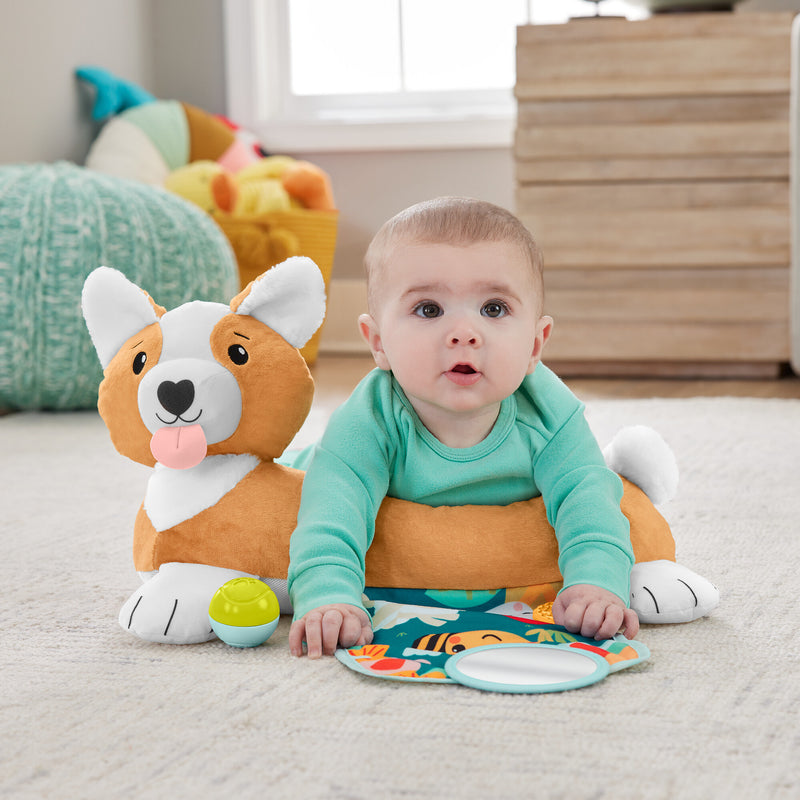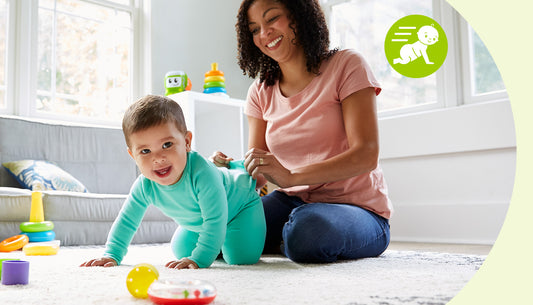
How to Calm a Crying Baby: Simple (and Surprising) Solutions from a Child Development Expert
Smilestones™ are about celebrating each moment & milestone for your child—and for you—throughout the first five years. Smilestones don’t come easily, perfectly or right on time, but that’s their superpower. They allow you to discover joy along the road of development, bumps and all, so you and your family can enjoy the ride.
“Why is my baby crying, again?!” It’s a question every parent has asked themselves many times. As a child development expert, I’ve worked with so many moms and dads who have experienced the same soothing struggle that you’re going through right now. And, as a parent, I also have firsthand fussy baby experience. So, please know that what you—and your baby—are going through is totally normal.
While I’m sure it’s helpful to hear you’re not alone, I know what you really need are some tips for when you are alone with your baby, at 3 a.m., during a cry-fest. And I’m happy to help.
Below you’ll find some info, techniques and tools that I’ve picked up through my work as a child development specialist and in my other full-time job as a mom. Take a look, try some things out and see what works best for you and your baby.

Get the gist
No time to read? No problem. If you and your baby are going through it right now, try this:
- Take them to a dim-lit or dark room- Play white noise or make ‘shushing’ sounds
- Rock, sway or a take them on a little walk wherever you are️

Why do babies cry and why is soothing so important?
For the first 12 months of life a baby has little to no language skills, so crying is their primary way of communicating. Babies cry for all sorts of reasons—hunger, gas, a dirty diaper, need for a change of scenery or some snuggles, overstimulation… the list goes on.
Soothing your baby and showing them how to self-soothe helps them slowly build the skills to regulate their emotions. Learning these behaviors sets them up to successfully cope with tired and cranky feelings in the future.
How to soothe a crying baby: the basics
Use these tried-and-true tactics to get that little one calm and snoozing away.
Rock or bounce your baby gently.
This comforts them because it reminds them of the motions experienced in their first home—a cozy, warm belly.
Play soft music or white noise.
Sound machine soothers help calm your newborn by blocking out other noises and reminding them of that same first home.
Center their focus with calming visuals.
Soft lights, a shiny mirror or slowly spinning animal pals on an overhead mobile will catch their eye and calm them down when overstimulated.
Let them chomp & chew.
It’s natural for babies to explore and self-soothe with their mouths. Look for teething toys with a variety of textures and chewable materials that stimulate the sucking reflex.
Surprising soothing tips
Maybe your baby isn’t responding to the typical soothing methods (that’s ok—every baby is different). I’ve learned tons of unique methods while working with families and through trial and error with my own little ones. Try these tips to help calm your baby.
Face your baby away from you.
You know when you’re irritable and just want to be left alone? Your baby is the same way, and your face can add to their overstimulation. Try taking them to a quiet, dim room, cradle them with their back to your belly, sway and make soft shushing sounds.
Give some good vibrations.
Gentle vibrations remind your baby of their time in that cozy belly. This comforts them and may even help them sleep longer! Seriously, bassinets with built-in vibes are a game changer.
Co-regulate, AKA share the calm.
It can be hard to stay calm, especially during late-night cry sessions, but try your best by taking deep breaths while holding your baby close to your chest. As they feel you calm down, they begin to relax too—and learn how to regulate their own little body.
Just sing anything.
Softly sing while rocking your little one. Don’t know the words? That’s okay, they don’t either! I love to sing “ma ma ma” or “da da da” to a familiar tune like Twinkle Twinkle Little Star. It keeps me from stumbling on the words and introduces my baby to the sounds they’ll use to call me “mama!”

My baby still won’t calm down—why?
I get it, I’ve been there (and many nights, still am). We don’t always know why our babies cry. If your baby won’t calm down, don’t blame yourself. Self-soothing is a complicated process, and some little ones take more time to figure it out than others. If you have specific concerns, talk to your pediatrician.
Parent check-in
Hey, how are things? Hanging in there?
Being a new, little baby in this great, big world is fun and tiring and overwhelming and amazing—just like being a new parent. You and your kiddo are in the same boat, and both of you need some TLC.
Today, I challenge you to find a couple minutes to yourself both physically and mentally. Try it now: Close your eyes and take three deep breaths.
Feel a tiny bit clearer in that head of yours? I hope so. You deserve it. You are doing BIG things raising that tiny human. You got this.






